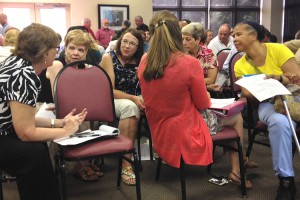By Andy Brack, editor and publisher | Not enough praise can be heaped on state Rep. Jenny Horne, R-Summerville, for her moving, emotional plea on Wednesday night that refocused House colleagues after hours of debate on removing the Confederate flag off of the Statehouse grounds.
![]() “Thank God for Jenny Horne,” state Rep. James Smith, D-Columbia, said Thursday. “What Jenny said was really right on target and brought the debate where it needed to be.”
“Thank God for Jenny Horne,” state Rep. James Smith, D-Columbia, said Thursday. “What Jenny said was really right on target and brought the debate where it needed to be.”
After a full day of debate as discussion continued on the House floor about a bill that passed 37-3 on Tuesday by the state Senate, Horne took the floor at a pivotal moment to urge House members to pass a “clean” bill — one with no amendments — so that it could go straight to Gov. Nikki Haley to be signed and not have to return to the Senate, creating more delay.
Horne, who reminded colleagues that she was a descendant of Jefferson Davis, president of the Confederacy, said it was time to move on and take down what had become a symbol of hate. Her voice quivered with emotion and strength:
“I cannot believe that we do not have the heart in this body to do something meaningful — such as take a symbol of hate off these grounds on Friday — and if any of you vote to amend, you are ensuring that this flag will fly beyond Friday. And for the widow of Sen. [Clementa] Pinckney and his two young daughters, that would be adding insult to injury — and I will not be a part of it.
“And for all of these reasons, I will not vote to amend this bill today. We may visit this another session, another year. But if we amend this bill, we are telling the people of Charleston: We don’t care about you. We do not care that someone used this symbol of hate to slay [nine] innocent people who were worshiping their God.”
Others who deserve pats on the back for getting House members to move forward and pass a clean bill are former House Majority Leader Rick Quinn, R-Cayce, who worked with House Minority Leader Todd Rutherford, D-Columbia, to develop a compromise that toppled an effort to kill the removal effort by drowning it in amendments. Hats off also to state senators who acted swiftly to send a clear message — a 37-3 vote — that flag removal had become a mainstream movement.
You’ll hear that removing the flag won’t change some attitudes. Maybe. But one thing is for sure — getting rid of it from what should be the neutral ground for our state’s leaders is way better than perpetuating a symbol of a war that ended 150 years ago. Dum spiro spero, South Carolina. Woo hoo.
PEOPLE IN RURAL COUNTIES across South Carolina know the challenges they face.
They know about their high poverty, higher than normal unemployment, challenged schools and need for better health care facilities. They understand how their tax rates are higher than urban areas because of the lack of a broad industrial tax base to help fund local services.
But they also know these problems can be solved. They just need more resources, better infrastructure and more collaboration to get things done.
That crystal clear message came through in three town hall meetings — one each in Bamberg, Allendale and Barnwell counties — put together by the SouthernCarolina Alliance to listen to ideas for change as the organization works to roll out opportunities through a new federal Promise Zone designation.
“If you don’t change, you die,” one woman succinctly said. Almost 300 people turned out at the three sessions — a phenomenal number of leaders, black and white, from a dynamic cross-section of the communities. Their dreams and enthusiasm for the future were contagious. Long ignored by the powers that be, they are starting to see the great possibilities offered by collaborating with new partners and being able to tap into federal grant programs in special ways because of the Promise Zone designation.
Real changes in the six counties of the Promise Zone are possible. But leaders in these counties, just like those in other rural counties across the state, must work together and seize the ripe opportunities that are there for the taking.





 We Can Do Better, South Carolina!
We Can Do Better, South Carolina!
























